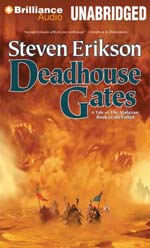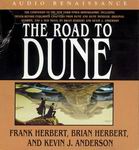
 Deadhouse Gates (Malazen Book of the Fallen #2)
Deadhouse Gates (Malazen Book of the Fallen #2)
By Steven Erikson; Performed by Ralph Lister
34 hours [UNABRIDGED]
Publisher: Brilliance Audio
Themes: / epic fantasy / magic / desert / empire /
Publisher summary:
In the vast dominion of Seven Cities, in the Holy Desert Raraku, the seer Sha’ik and her followers prepare for the long-prophesied uprising known as the Whirlwind. Unprecedented in size and savagery, this maelstrom of fanaticism and bloodlust will embroil the Malazan Empire in one of the bloodiest conflicts it has ever known, shaping destinies and giving birth to legends…. Set in a brilliantly realized world ravaged by dark, uncontrollable magic, this thrilling novel of war, intrigue, and betrayal confirms Steven Erikson as a storyteller of breathtaking skill, imagination, and originality — a new master of epic fantasy.
This book was pretty amazing. I want to say that right off the bat. This book is something special. Steven Erikson has a wonderful way of writing about things that we know nothing about as readers but by the end of the book you look back and have a whole new appreciation for everything you read previously. His foreshadowing is so subtle and wonderfully done that you don’t even realize that you realize that it’s coming, until in comes.
The characters are all very cool, including a few characters who return from Gardens of the Moon. Kalam is a real favorite of mine; I really like his progression in this book as he is originally from Seven Cities and it affects him on an emotional level. I also absolutely love Mappo and Icarium. Those two were by far in my opinion the most interesting characters, and their relationship is memorable.
We get to see a whole new continent in this book in Seven Cities, with a middle eastern, desert feel. The Whirlwind is an interesting concept; there is no doubt that this is another world that is extremely dangerous and volatile. There is no safety anywhere and almost every decision made is one of life or death.
This book ends in a truly epic fashion and I think that anyone who enjoyed Gardens of the Moon will undoubtedly love Deadhouse Gates. It has awesome magic, epic sword fights, political intrigue, and some truly horrifying monsters. This book in my opinion surpasses Gardens of the Moon and sets the stage for a truly epic series that I can’t wait to finish. This is only the second book of ten and I just can’t wait to see where this story is going to go. I cannot recommend this book enough.
This book is read by Ralph Lister who really brings these characters to life in a way that is truly believable. It’s as if there are a whole cast of people reading this book. He does such a wonderful job. I look forward to listening to Memories of Ice.
Posted by Scott Russell

